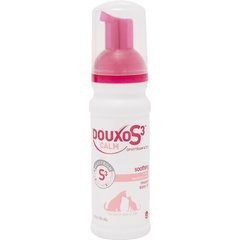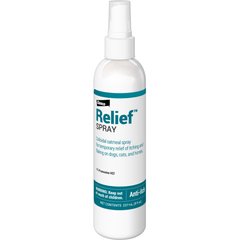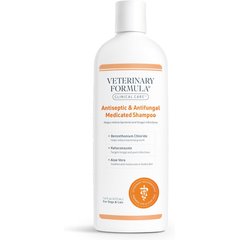Can Dogs Be Allergic to Cats?
chendongshan/iStock / Getty Images Plus via Getty Images
You may be surprised if your dog starts sneezing, itching, or even developing ear infections after you bring home a new cat.
You might even wonder, “Can dogs be allergic to cats?”
While experts assure us that a cat allergy doesn't mean saying goodbye to your new pet, dogs can be allergic to cats. Cats can also be allergic to dogs.
Let’s look at what veterinarians and veterinary dermatologists say about canine allergies and how to manage them.
Allergies in Dogs
Allergies are an overreaction of the immune system to substances that are typically harmless. Rather than ignoring things like pollen, pet dander, or certain foods, the body attacks them, causing reactions such as itching and sneezing.
If your pet has allergies, “they are not immune-efficient, they’re an over-the-top-responder,” explains Stephanie Bruner, DVM, DAVID, clinical assistant professor of dermatology at the University of Illinois College of Veterinary Medicine.
Allergies can affect a dog’s respiratory system, skin, and digestive tract. Without help from your vet, it can be tough to differentiate allergies from other common conditions, such as a cold, skin irritation, or gastroenteritis.
Some common allergy symptoms in dogs include:
-
Itchy, watery eyes
-
Redness of the skin
-
Generalized itching, scratching, and chewing the skin
-
Sneezing or reverse sneezing
While any dog can develop allergies, some are inherited, says Lorraine Corriveau, DVM, DAB, DABLS, a primary care clinician at Purdue University College of Veterinary Medicine Veterinary Hospital. She suggests that when choosing a puppy, you should ask about the parents' allergy history, just as you would about their hip, heart, or eye health.
Some breeds, such as Labradors, Bulldogs, Cocker Spaniels, and Pugs, may be predisposed to allergies.
Can Dogs Be Allergic to Cats?
Yes, dogs can develop allergies to cats. While scientists understand what causes cat allergies in humans (a protein called Fel d 1 found in cat saliva and skin oils), the exact cause of cat allergies in dogs is still somewhat unclear.
You can work closely with your veterinarian to develop an allergy management plan that lets you enjoy the companionship of both pets.
The same allergen (Fel d 1) may affect humans and dogs, “but we don’t know exactly,” says Mitzi Clark, DVM, DACVD, assistant clinical professor and dermatology section chief at Cornell University College of Veterinary Medicine.
Symptoms of Cat Allergies in Dogs
Cat allergies in dogs often share symptoms with other allergies, like itching, sneezing, and watery eyes.
This can make diagnosing cat allergies in dogs a bit tricky. Fortunately, pinpointing the exact cause isn't always necessary to provide relief for your itchy pup.
Diagnosing Cat Allergies in Dogs
Dermal skin allergy testing can help diagnose cat allergies, but it's typically not the first step your vet will take. Instead, they'll likely start by examining and treating your dog for secondary infections, like skin and ear infections.
“I always try to make the dog more comfortable,” Corriveau says, so she might recommend anti-itch treatments such as a medicated mousse or relief spray, or medicated shampoos in addition to any necessary antibiotics for a skin infection. Common antibiotics for skin infections in dogs include oral cephalexin and injectable Convenia®.
Recommended Products
Next, your vet will gather information about your dog's history, such as when symptoms started and if they’re seasonal.
They’ll also ask if your dog is on a year-round flea preventive. “If the answer is yes, great—next step,” Bruner says. If they’re not, your vet will recommend starting a flea preventive.
If food allergies are suspected, your vet may recommend feeding your dog a special diet for several weeks to see if symptoms improve.
Dogs can suffer from food and environmental allergies simultaneously, or from multiple environmental allergies at once, which can complicate the diagnosis. “That's where we potentially would talk about doing an intradermal skin (skin prick) test,” Corriveau explains.
However, Clark notes that when multiple allergens are involved, it can be challenging to determine how much a cat is contributing to the dog's symptoms, even with dermal allergy testing.
What To Do If Your Dog Is Allergic to Cats
If the skin prick test determines your dog has allergies to cats as well as other triggers, your vet might suggest a plan that reduces their overall allergen exposure, such as:
-
Wiping your dog’s paws after spending time outdoors.
-
Using a HEPA air purifier, especially during the summer months when pollen levels are high or if you live in an area where wildfires are common.
-
Bathing your dog once or twice a week. Corriveau recommends using an over-the-counter shampoo with ophytrium, like Douxo S3™ CARE. This gentle shampoo removes allergens and restores the skin’s natural microbiome.
-
Washing or vacuuming your rugs and furniture, and your pet’s bedding, regularly.
"By reducing exposure to other allergens, you can lower your dog’s immune response and potentially alleviate symptoms," Bruner explains.
However, if these steps aren't effective, wide-spectrum prescription and non-prescription treatment options are available, including:
-
Purina® Pro Plan® LiveClear dry cat food: According to Corriveau, this food for cats has been shown to decrease the number of allergens in a cat's saliva and dander by almost 50%. It comes in adult and senior formulas.
-
Oral allergy medications:
-
Over-the-counter (OTC antihistamines): Benadryl®, Zyrtec®, and Claritin® are only about 10% effective in helping control itching in dogs. Corriveau says this is because dogs have a different immune response to allergens than humans, with histamines responsible for the response in humans, and cytokines in dogs. Always consult your vet before giving your dog any human medication.
-
Prescription Apoquel®: This is an excellent daily oral medication for dogs. Skipping even one dose can cause allergy symptoms to return, Corriveau says.
-
-
Injectable allergy medication: Cytopoint® can be administered by your vet and typically lasts four to eight weeks, with most dogs needing injections about once a month.
While it can be disheartening to discover your dog is allergic to your cat, it doesn't mean you’ll have to rehome your cat.
Recommended Products
Corriveau explains that even if you remove the cat from your home, traces of their saliva and dander can linger, potentially continuing to trigger your dog's allergies.
You can work closely with your veterinarian to develop an allergy management plan that lets you enjoy the companionship of both pets.





